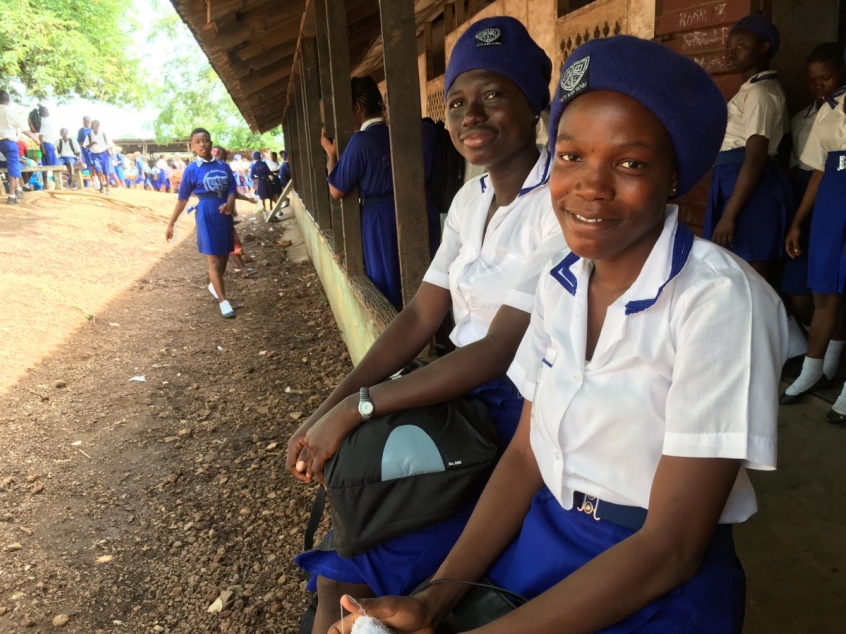
The Ebola virus that hit my country, Sierra Leone, orphaned 12,000 children here. Of course, the lives of girls and boys alike were devastated but – like in many crises – girls became victims multiple times over.
Today is the UN's International Day of the Girl Child. It is a reminder that many girls in countries like mine, and the world over, are struggling with inequality, which worsens in emergencies.
The way girls were treated during Ebola has changed their lives forever.
During Ebola, schools were closed down to avoid spreading of the virus. During that time, increased poverty and the death of caregivers meant that many teenage girls got pregnant. They were forced to find 'boyfriends' who could help them afford basics like food.
Most of these boyfriends disappeared as soon as the girl got pregnant leaving girls like Mariama and Aminata, pictured above, to fend for themselves, often without the support of a family. They resorted to picking up plastic on an enormous, sprawling dump to scrape together enough money to feed their babies.
Fortunately, Mariama and Aminata have been helped back to school through Street Child's programme. But the norm here is that teenage mums rarely get the chance to finish their education.
In some cases, parents – especially in remote communities – gave their daughters to early marriage. Child marriage is a key theme of today's International Day of the Girl, and rightly so. It is something that is all too common here and a major barrier to girls being able to go to school.
The girl orphans of Ebola faced many gender-specific challenges that didn't make the news. While some people would offer food and cash help to boys without expecting anything in return, many people would want to take advantage of girls and ask for sex in return.
When families did not have enough to send their children back to school, girls were the first to have be made to work instead.
There is no doubt for me that the impact of Ebola was worse for girls than for boys.
Yet I know that educating girls, and investing in girls' education, is one of the key actions in our post-Ebola recovery.
The role of girls – and educated women – in contributing to the development of a poor country like Sierra Leone cannot be underestimated.
An educated woman will better help her family to take preventive measures against a repeat of Ebola or other diseases, and will also promote hygiene. An educated woman serves as a role model for her girls, and will ensure that her children stay in school, providing them all the support they require.
Street Child's recent Girls' Speak Out consultation report noted that the main barriers stopping girls from accessing education were: income poverty, loss of the primary caregiver, teenage pregnancy, early marriage, child labour and lack of parental care.
Teenage pregnancy remains a very big challenge for us. Girls lack the proper education and preventive measures to keep them in school, and avoid pregnancies. Then there is another big challenge that girls face in school – with their male teachers, some of whom sell grades for sex or cash.
These challenges are hard to stomach. My Bible teaches me to care for the poor, especially the widow and orphan. In Matthew 25:40 Christ says that "whatever you did for one of the least of these brothers and sisters of mine, you did for me".
That's why I work for Street Child. It's a privilege to be able to carry out the Lord's commands doing a job I enjoy.
Street Child's latest programme in Sierra Leone will help 4,000 girls who are out of school, or are at risk of dropping out in the upper primary classes, and will support them to successfully transition into secondary school. These girls will be provided with extra classes, education material support, and business grants to enable their caregivers to sustain them in school. Around 4,000 siblings of these girls will also benefit from the business grants, and 400 teenage mothers will be able to to finish their education.
Thanks to programmes like these, girls like Mariama and Aminata are back in school today.
We know that change is possible.
I believe in girls. I know that we can change the world. We have so many opportunities ahead of us, if only we are given the right empowerment. I have seen so many girls, with huge potential, who could contribute to the development of Sierra Leone if only they are given a little support and encouragement.
I come from a very poor background, but because my parents believed in education, they invested in us and I am very proud to say that my sister and I are taking the lead in the family. Our lives have been transformed so much so that one could easily forget our background. All this is only made possible through the power of education. This is why I encourage girls wherever I go to grab the opportunity and give it their best.
Today, as we mark International Day of the Girl Child, we need to listen to the voices of girls, hear their problems and then be courageous enough to take action. Jesus always stood up for the poorest and most marginalised, and we should follow His lead.
Sia Lajaku-Williams is Programmes Director at Street Child of Sierra Leone.













